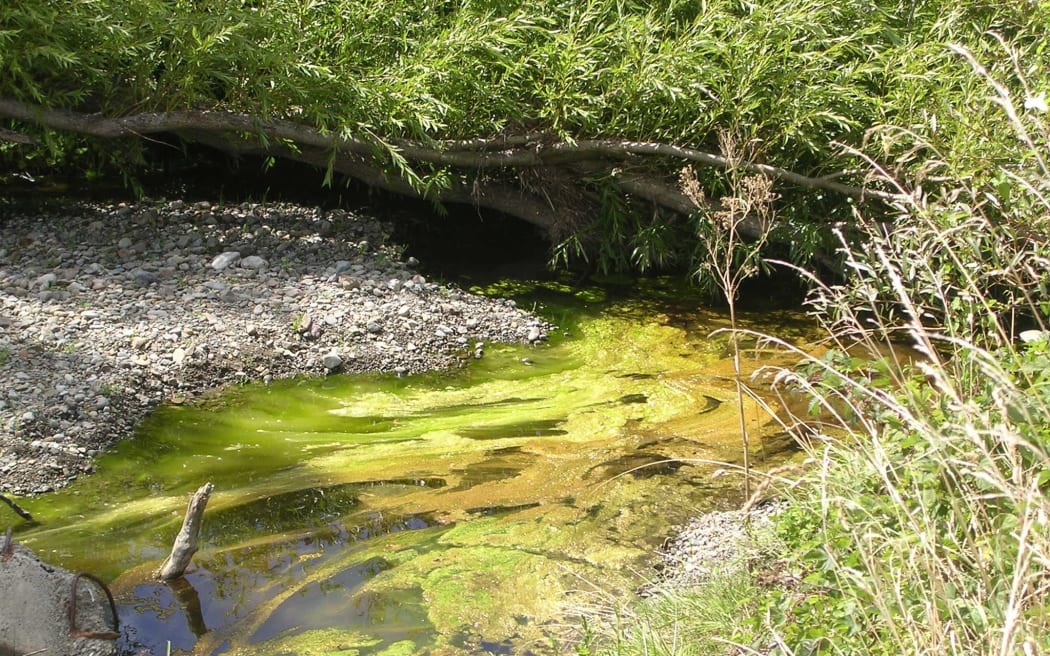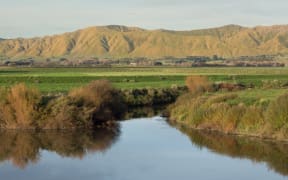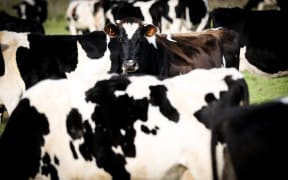The government has made more progress than any before on the environment despite a damning report released yesterday, Environment Minister Nick Smith says.
Dr Smith acknowledged that there were many long-term problems that needed to be addressed, but he said the government - and farmers - had made many improvements.
He said work was being done to lower the levels of nitrate leaching into rivers and that would pay dividends in the future.
"One of the strengths of having this open reporting is rather than having an argument about whether it's having an effect actually engaging the farming community about change and there is rapid change going on on farms across New Zealand," Dr Smith said.
But environmental advocates say New Zealand's first state of the environment report in eight years is a damning indictment on the government.

Rivers with high nutrient levels - which can be caused by farming run-off - can become choked by toxic algae. Photo: MASSEY UNIVERSITY
The landmark report, Environment Aotearoa 2015, by the Ministry for the Environment and Statistics New Zealand, identified a decline in water quality and a rise in soil compaction problems linked with farming as one of the biggest concerns.

Whio (native blue ducks) Photo: Matt Binns via Flickr / CC BY 2.0
The report also revealed many indigenous plants and animals are at risk of extinction - and the risk is rising.
Of the country's 2378 indigenous vascular plants, 235 are threatened with extinction and 683 are "at risk".
Seventy-two percent of freshwater fish are "at risk" or threatened, as are more than 80 percent of New Zealand's living bird species and 90 percent of lizard species.
Forest and Bird advocacy manager Kevin Hackwell described the report as sobering reading.
He said the native species statistics were not suprising when, according to the report, most of the country was affected by pests like possums and stoats.
Another problem, he said, was the loss of native vegetation - and, therefore, important habitats - due to the intensification of farming.
"New Zealand actually has good environmental laws - the Resource Management Act, the Conservation Act etc. We have them, the big problem is actually the failure of adequate implementation and monitoring and enforcement of those laws."

Nathan Argent Photo: RNZ/ Daniela Maoate-Cox
Greenpeace chief policy advisor Nathan Argent said the report was a wake-up call for the government.
"For a long time now, the environment movement, scientists, academics have all been saying to the government they really need to start taking environment issues much more seriously.
"We've warned about industrial dairying and the impact it's having on water quality, we've warned that the government's lack of action is leading to emissions spiralling out of control - so, for many of us, it's really a summary of the stuff we've been saying for a long time now."
While many environmental advocates lauded the Ministry for the Environment for the report's robustness and rigour, others were not as impressed.
Massey University freshwater ecology lecturer Mike Joy criticised the way the ministry had collected and analysed some of the data - and what he said was a lack of independence.
"I don't like it that the Ministry for the Environment's basically reporting on themselves," he said.
"There's no independence here. They are the Ministry for the Environment, they have a role in protecting our environment and they also report on the state of it - which is wrong in my book."
Call for better data collection

Marie Brown Photo: Marie Brown
The report acknowledges problems with the data - in fact, it calls some of the data patchy.
For example, the Ministry for the Environment is unable to report on changes in industry emissions - such as those caused by burning coal at dairy and meat processing plants - at a national level, because the information is unavailable.
Environmental Defence Society policy analyst Marie Brown said it was great that mandatory reporting was now taking place, and she would take a closer look at the data in the next few days.
"In some cases we simply don't have the data... If there's a data gap, we need to invest in filling that over time and appropriately resource the relevant agencies to collect that."
Federated Farmers environment and water spokesman Chris Allen, meanwhile, said farmers had been making a huge investment into improving water quality.
Farmers needed to work smarter but towns and cities were also causing problems, he said.
"It's not just a farming issue and we can't just focus all the time on water quality in farming.
"But we do have an impact on the water quality, and that's a job that we're addressing through the likes of the good management practice and farm environment plans, and regional councils are implementing those all round the place."
Mr Allen said everybody was in this together and needed to work to improve the scorecard.



